Deliberation Versus Marketing: In Defense of the Iowa Caucuses
By Mike Miller
Our Revolution’s Board Chair Larry Cohen writes, “During the [Unity Reform] commission, we argued for more states to have primaries, and set more rules for those states that decided to continue with caucuses. Moving forward, we need to focus on voting rights in the party nominating process at all levels.” I hope he will reconsider his view.
If you think the political process is about selling a product, then primaries are terrific. The decline of significant voluntary associations in which people talk with one another about public affairs leaves no significant mediating bodies between the individual voter and candidates, resulting in mass and social media, and door-knockers who spend a couple of minutes selling their candidate “at the door,” influencing how votes are cast. Sound bites and pre-packaged sales pitches are what the potential voter is exposed to.
Contrast that with the months of neighbour/co-worker/co-religionist asking each other, “Who would be our party’s best candidate to beat the other party?”, and “What issues are most important for the nation’s future?” The Iowa caucuses are the closest thing we have in American politics to the town hall meeting of the past, though they were far from perfect—for two reasons. Most people were ineligible to participate: women, slaves, indentured servants, teenagers, or men without property or income couldn’t vote. Further, if you were in debt and your creditor was at the meeting, and a matter important to him was on the agenda, he influenced how you voted—whatever the “merits” of the case.
Critics say the caucuses are undemocratic because “only” 30% of the eligible voters participated. Caucus participants don’t make public policy; they don’t legislate. Rather, they are the people most concerned with who will make public policy—i.e. who will best represent me to the voters in November. “Democratic” isn’t the right category to apply here; it applies to governance, not to nominating party candidates.
Primaries were instituted to bypass the old “political machines” in which professional politicians in cigar smoke filled rooms made deals that determined platforms and candidates. But cleaning out the machines replaced one set of problems with another. The primary system rewards those who have the money to market themselves—either they are independently wealthy (Bloomberg, Trump, Steyer) or dependent on those with a lot of money (Biden, Buttigieg and others).
Thus far, only Sanders has been able to fully overcome dependence on large donors. But his army of volunteers presents a different problem: “activists” don’t represent the views of registered Democrats. The 1972 George McGovern campaign painfully illustrated that; he won the nomination because of a volunteer army, and carried only two states in the whole country in the general election. (Because “anybody but Trump” is a deep sentiment in the country, Sanders as nominee would do better.) At the other end of the political spectrum, the Barry Goldwater 1964 presidential campaign illustrated the same point.
There is a democracy problem, but it is a different one. To a great extent, what is said during pre-Party convention and pre-election months bears little relationship to what happens during governance. That’s because real power in the United States now is concentrated in the hands of a relative few who have lots of money, and because “The Market” and politicians respond to that money, not to a one-person/one-vote democratic system. Solving this problem will require at least dramatic tax reform (during the Eisenhower Republican Administration, the marginal income tax rate was over 90%, and there were steep corporate taxes), vigorous anti-trust action, breaking up the big banks, a strong public sector and more. Billionaires and multi-millionaires are incompatible with democracy.
Incompetence and probable naiveté about the “app” that was supposed to do the counting have made the Iowa caucuses a national joke. Perhaps Iowa will abandon them. Probably it will lose its place as the first state in the nominating process. That’s all too bad.
.
Go here and listen to “The Day Democracy Died” Sung by The Founding Fathers. It sums it all up.
…
Senate Conducts Another U.S. Trial Where Racism Decides the Outcome
By Max Elbaum
January 31, 2020
It’s no accident that on the same day the Senate voted not to hear any witnesses in its sham impeachment trial the Trump administration announced it was adding six countries, including Nigeria, Africa’s most populous nation, to its restrictive travel ban.
Get beneath the rhetoric and both actions are about race and racism. As has been the outcome of so many trials and so many immigration policies in U.S. history.
The bottom line consideration in those Republican senators’ minds when they voted today was revealed by a conservative former GOP policy director who still has ties with his old friends. Evan McMullin tweeted the day before the vote:
Decoding that doesn’t require re-reading the pages in “To Kill a Mockingbird” about that story’s jury verdict:
“The country is quickly changing” means “the proportion of people of color is growing and white people soon might not be a majority.”
“They must use the power they have now” means “democracy is a nice idea that we’ve said we believe in for decades, but when it comes right down to it maintaining white power in general and our white power in particular is more important.”
“Even by harming the Republic” means “if authoritarian rule and an above-the-law strongman president will do the job, then let’s get it on; all we need is four more years to create the necessary facts on the ground, we’ve helped the Israelis do it and in face of a “demographic threat” in this country it’s now our turn.”
That’s the mind-set underlying the “no witnesses” vote and the upcoming acquittal.
This does not mean every Trump voter or registered Republican is a full-blown hater. It doesn’t mean that over time many in the Trump camp, especially those facing economic hardship, can’t be won over to a different world view. It does mean the robber barons on top of the fossil fuel industry or military-industrial complex or Koch brothers empire see riding this mentality as the necessary route to advancing their class interest in a changing world.
But the Senate vote shows that outright racist authoritarianism is in the driver’s seat in today’s GOP. It’s get in behind the Supreme Leader or be kicked out of the club.
This is how fascism comes to power. People who start out quite a distance from the blatant haters cut deals with them because they share some common aims and think they can stay in control. But it’s a slippery slope and those who don’t jump off the toboggan soon enough find themselves abandoning every principle they once claimed to hold dear (Lindsey Graham, Marco Rubio, Lamar Alexander). They sometimes squirm but keep rationalizing one destructive, sycophantic action after another until lies, self-dealing and great-leader-worship become normalized in the broader society. And millions get numb or “go private” hoping to find some shelter from the storm.
In today’s U.S., the Trumpists can be stopped. But only if the most conscious sector of the opposition is clear-eyed about the danger and absolutely determined to do two things:
First, confront their drive toward a racist authoritarian regime with a passionate resistance rooted in defending the humanity and equality of everyone across the globe;
Second, inspire and bring into unified action the substantial majority of U.S. people who disagree with one another on many things but agree Trump and his enablers are a danger to people and the planet: defeat Trump and the GOP at the ballot box in November, take to the streets to defend that victory in the days after the balloting when he declares the results illegitimate, and then keep on pushing toward a society that works for all.
…
The Rightness of Negro League Player reparations
By Ernest DiStefano
Editor’s Updates:
Ernie DiStefano’s interview on Sports360 with Jeff Fannell can be heard here on SoundCloud
For more information listen to Ernest DiStefano interview on WPFW FM in Washington DC. The interview begins at the 32 minute mark. Or go here for a selection of shows from the WPFW FM program The Collision: Sports and Politics.
For Ernest DiStefano’s Bill Fletcher’s interview go here
.
” Ernest DiStefano has written a stirring appeal for reparations for Negro League ballplayers and their descendants. This appeal in the form of a letter to Major League Baseball Commissioner Rob Manfred is being published in The Stansbury Forum. The letter arrived on the Commissioner’s desk on January 22 in the midst of the video sign stealing crisis. Hopefully, but certainly not without public pressure, Manfred will feel compelled to answer “The Rippling Manifesto”.”
.
“THE RIPPLING MANIFESTO”
The following essay is from a letter I recently sent to Major League Baseball Commissioner, Rob Manfred. If upon reading this essay, you agree with the cause for which I am advocating, please make your voice heard by contacting The Office of the Commissioner of Baseball, 1271 Avenue of the Americas, New York, NY 10020; 212-931-7800. You may also contact Commissioner Manfred on his Twitter account (twitter@RobManfred). Thank you.
Dear Commissioner Manfred,
Robert Kennedy said that “each time someone stands up for an ideal, or acts to improve the lot of others, or strikes out against injustice, they send forward a ripple of hope.” It is in this spirit that I am making a direct appeal to you, and your thirty fellow stewards of the great sport of baseball, to right the wrong of your predecessors and provide direct monetary reparations to the Negro League players and their surviving family members. There are three considerations that drive this request: RIGHTNESS, ATTAINABILITY, and REWARD. I will address each of these separately.
______________________________________
First, the moral RIGHTNESS of Negro League Player reparations is undeniable and supported by several historical facts:
- The Major League Baseball establishment intentionally conspired to deprive Negro League baseball players of the opportunity to showcase their talents on baseball’s biggest stage; thereby depriving them of the opportunity to improve the standard of living for themselves and their families;
- Throughout the years, Negro League teams competed against white Major League teams in at least 438 exhibition games during the offseason. Of those, the white Major League teams won 129 games and the Negro League teams won 309 games. This translates into a winning percentage of more than .700 for the Negro League teams, leaving little doubt that Negro League players had the skills to compete at the Major League level.[1]
- The vast disparity between the average player salaries in the Negro Leagues and the average Major League player salaries are amplified by the following examples:[2]
- During the 1880’s, the first all-black baseball team was established in Babylon, Long Island, New York. This team began barnstorming in the Northeast region of the United States. Its players made $12.00 to $18.00 per week, while the average major league baseball player’s salary during that decade was $3,012.
- In 1905, the average major league player made $2,000 per season; the average minor league player made $500 per season. The average Negro League player made just $466 that year. During the 1920’s, monthly Negro League player salaries averaged approximately $230, but most of them made between $40 to $100 per month plus expenses, and during the 1930’s, a depression-ridden decade, those salaries dropped to approximately $170 per season.
During my research, I used a sabermetric tool that you and the MLB owners are well aware of and widely considered the current benchmark statistical category for determining a player’s value: Wins Above Replacement (WAR). Every Negro League player I researched had a career WAR score that was in the positive range. When combined with the aforementioned record of the Negro League teams versus the white major leaguers, and using a 0.0 War score as the definition of an ”average” player, any reasonable observer would agree that the Negro League players would have been entitled to at least the average major league salaries of their time.
The unfortunate reality, as you know, is that very few Negro League players are still alive. I therefore believe the surviving generations of the families of the deceased players should receive the monetary reparations on behalf of those players. Studies performed by the Chronic Poverty Research Centre indicate poverty is often intergenerational among families. A CPRC study that was presented in London, and published in a series of working papers, showed that access to asset inheritance helps build resilience and prevention of intergenerational poverty.[3] Since, therefore, these families suffered as a result of their ancestors’ forced poverty, they should now benefit from its rectification.
______________________________________
I have heard the broader arguments against reparations. One of these arguments is that reparations are economically impractical. This leads me to my next factor for consideration: ATTAINABILITY.
In the case of Negro League reparations, there is a specific, finite number of individuals who would receive these reparations. Using the average Major League player salary for each decade prior to 1947, the year Jackie Robinson broke the color line in baseball, and the career spans of the Negro League players, I calculated the total career salary compensation that the 129 Negro League players I have identified and researched would be entitled to, based on the dollar values during the span of their playing careers. The results of these calculations indicate that combined total reparations for these players would be $32,634,141. When divided equally between the owners of the thirty Major League Baseball franchises, this amount comes to $1,087,804.70 contribution per franchise; a small price to pay, in my view, when you consider the following facts[4], ones with which you are undoubtedly familiar:
- The average major baseball player currently receives a salary of $4,360,000 and the absolute worst major league player is currently required to make a minimum salary of $555,000.
- In 2018, Major League Baseball teams generated a total of 9.9 billion dollars in revenue, nearly twice the annual revenue from ten years ago (5.82 billion dollars), with an average of 330 million dollars in revenue per each Major League franchise.
- In 2019, the average revenue multiple per MLB franchise (a determining factor of a franchise’s value) was 5.19, more than twice the figure from 2011.
- Almost 30 percent of the MLB’s total league-wide revenue was earned from ticket sales in 2017. In November 2018, Major League Baseball and Fox Sports announced an extension of their national television rights agreement through the 2028 season and is worth 5.1 billion dollars.
- Major League Baseball has additional deals with Facebook, ESPN, and Turner Sports. In addition, MLB and its franchises generated 938 million dollars in sponsorship revenue during the 2018 season, a steady increase in revenue over the past decade.
I understand and respect that the time and manpower required for completing the reparations process may be a concern for you and MLB owners; consequently, I would like to offer my services, free-of-charge, to assist you in this effort by creating a team of people who, like myself, have a passion for this cause. Furthermore, any financial reparations that are subsequently distributed will not be handled by me or any member of my team; instead, said reparations could be delivered directly from Major League Baseball to the players or their beneficiaries.
______________________________________
Another chief argument used against reparations is a philosophical one: that the current generation is not responsible for the acts of previous generations, and should therefore not be required to shoulder the burden of righting the wrongs of previous generations. I see reparations not as a burden, however, but as an opportunity for Major League Baseball and other industries. This brings me to my third and final factor for consideration: REWARD.
Brooklyn Dodgers owner Branch Rickey is regarded, and rightly, as a courageous man who was a champion for social justice inside the Major League Baseball industry. Yet Mr. Rickey also had his detractors who accused him of signing Jackie Robinson simply for purposes of profit. Mr. Rickey himself acknowledged the business benefits of breaking baseball’s color line and expanding baseball’s fan base to the African-American community. We must remember, however, that there were fifteen other MLB owners at the time, all with the primary goal of maximizing their teams’ profit margins, who refused to employ a black baseball player. Through his actions, Mr. Rickey demonstrated that businesses can champion social justice and in the process enhance their bottom lines. Because of Mr. Rickey’s brave leadership, the Brooklyn Dodgers earned the title of Black America’s team. We can therefore conclude that, as with the beneficiaries of any righteous act, those who benefitted from Mr. Rickey’s actions cared little about his motivations.
I now move forward to the twenty-first century. In a 2014 Nielsen report, African-Americans comprised just nine percent of MLB viewers and according to Nielsen ratings released in 2017, the average viewer for a Major League Baseball telecast was a fifty-three-year-old white male.[5]
When considering the above Nielsen data, it is likely
that Major League Baseball could increase their current African-American fan
base by following the successful business model put forth by Branch Rickey
seventy-three-years ago. By doing so, Mr. Manfred, you and the Major League
Baseball owners will be that resounding ripple of hope that Robert F. Kennedy
spoke about so many years ago, and in the tradition of Mr. Rickey, establish a
business model for other industries to emulate. Then, with each subsequent
small step and tiny ripple, you will have created a tidal wave of justice that
our world so desperately needs.
[1] “Baseball,” Documentary Film by Ken Burns, 1994
[2] Negro League Database, Seamheads.com
[3] Chronic Poverty Research Centre, Copyright 2005-2020, Chronicpoverty.org
[4] “Revenue of Major League Baseball Teams,” by Christina Gough, September 16, 2019, Statistica.com
[5] “The struggles of being a black baseball fan,” by Stephon Johnson, August 30, 2018, theweek.com
…
Letter From Paris: Etiquette
By Eileen Hirst
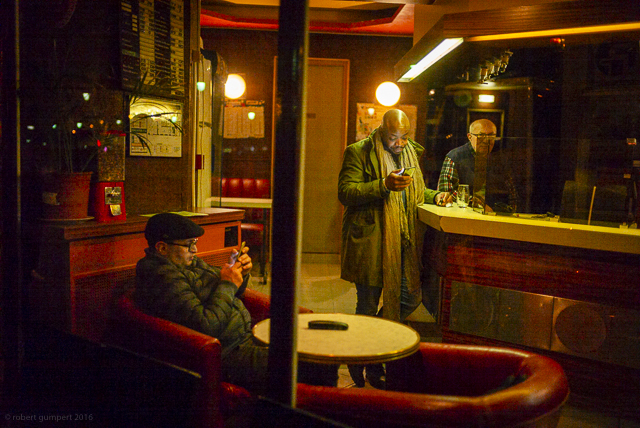
There is nothing in France that does not have rules of etiquette attached. For example, never go into a cafe, belly up to the bar and wave to, or worse, bellow at, the server. One is expected to take a stool or stand and wait to be acknowledged. Then and only then do you ask for what you would like, and you had better have preceded that with “bonjour” or “bon soir” or you will be waiting a long time for your coffee or drink. A good friend and I met for a drink at my cafe one hot July night. The server was washing glasses behind the bar. She did not wait for him to make eye contact and acknowledge her. She leaned over the bar and said, “I’ll have a white wine.” If you could have seen the look he gave me, who he knew as a regular, for somehow allowing this to happen. Yikes! I greeted him formally, apologized and said my friend would like a white wine. We were served somewhat stiffly, but I left a big tip and he was back to his normal self the next day when I went in on my own.
So, yes, the libraries have etiquette. One takes one seat, hangs one’s coat on the back of the seat and does not allow one’s stuff to stray into the territory of another seat. This applies no matter how crowded or not the library is. I am in the Pompidou now. It has very long tables that hold 22 places each. The library is as empty as I have ever seen it, may three or four people at each of the over a hundred tables on this floor. No one has spread their stuff out. People have drinks, but they must have twist-off caps, no open sodas. There is no eating at the tables. None. Note even a candy bar. Everyone is silent.
Occasionally, during the holidays when students are cramming for their baccalaureate exams (which determine which colleges they will qualify for, and which seems to involve the use of an arsenal of different colored highlighters, pens and pencils that all get packed into chic little leather zippered cases at the end of the day), students will huddle in small groups and speak in urgent whispers, but only for a few minutes. If you want a snack or need to use the rest room or step out on the smoking deck, at this library, you take your computer and phone with you, but you can leave everything else to save your spot.
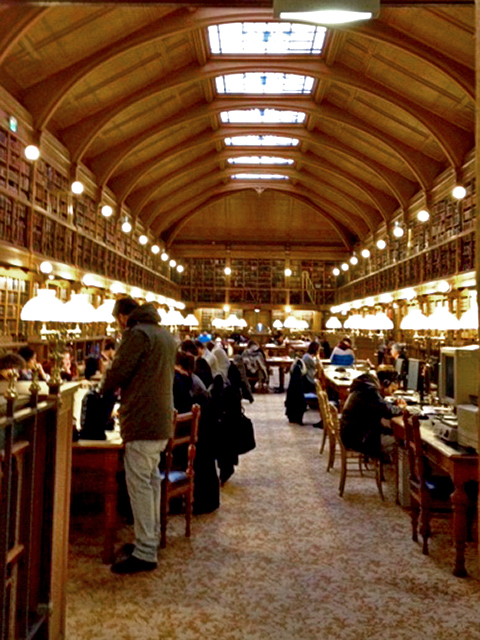
Photo: Eileen Hirst
At the library in City Hall, there are only 100 seats, and they are 100+ year old chairs at equally antique, leather-topped wooden tables, each place marked with a gold-embossed number. If all the seats are taken, you can wait outside, four floors down, for someone to leave. You may have bottled water, but the water is to stay on the floor to prevent damage to the tables. You used to be able to bring a sandwich with you and step into the vestibule to eat it, but now there is a discreet sign at the reception desk explaining that due to an infestation of mice, this is no longer allowed. You may leave for lunch and leave everything at your place because it takes a photo ID, a pass issued by City Hall security, and a reading of your bar-coded Paris library card to get in. And, the entire space is staffed full time by a rotating cast of librarians who sit at two elevated stations. Electrical outlets at this library are scarce, so people share. There is one table of ten that is reserved exclusively for City Hall employees. You may not sit there, even if the table is empty, which it often is. if you are found wandering anywhere else in City Hall, which is not a public building, your library card will be confiscated.
I have also been to the St Genevieve library at the Sorbonne, where I had to apply for and be issued a special ID I got by showing my California bar card. This library is several hundred years old and used every day by hordes of university students. Non-students are charged ten euros a day and the wi-fi is terrible, so I almost never go there. The Mazarine is a national library where many of the France’s most valuable original documents are kept. Anyone can go in there with just an ID. It is an amazing place, where white-gloved researchers pore over ancient books and files. It is also a place that has a bunch of regulars, generally old guys who pay 75 euros a year to be guaranteed a seat. I have been there a few times, but it isn’t very comfortable.

Photo: Robert Gumpert
The Pompidou is what every major city should have. It holds thousands of people and offers all sorts of programs and amenities people really use, and they are all free. There is a section of one floor that has every newspaper and magazine you can think of. There are comfy chairs for people who want to watch videos; half a floor of stuff for kids; and, a huge language lab where you can study any language you want, staffed with people who will help you figure out at what level you need to start. There are also conversational French classes for non-native speakers. Unfortunately, the strike has made these unavailable.
Nobody at any of these libraries ever has to be told to be quiet or to take their feet off the furniture. French children seem to be born knowing how to behave in libraries — parks and the metro, too.
.
And from the pension strikes: The Louvre closed as workers went on strike to protest pension reforms.
…
STRATEGY, TACTICS, AND ORGANIZING
By Glenn Perusek
From Editor’s Desk: My friend and comrade Glenn Perusek enlisted me in 2016 to co-teach courses in the Building Trade Academy (BTA). The BTA is housed at Michigan State University; it serves the affiliates of the North America’s Building Trades Unions (NABTU). We teach a series of four-day courses on basic organizing skills and planning. One of the issues for all trade unionists is understanding the difference between strategy and tactics. Glenn wrote this fine exposition on the differences between the two and their application to the work of organizing, particularly in the construction trades. Glenn’s essay follows along with audio of the interview I did with Glenn on this topic in September 2019. Peter Olney
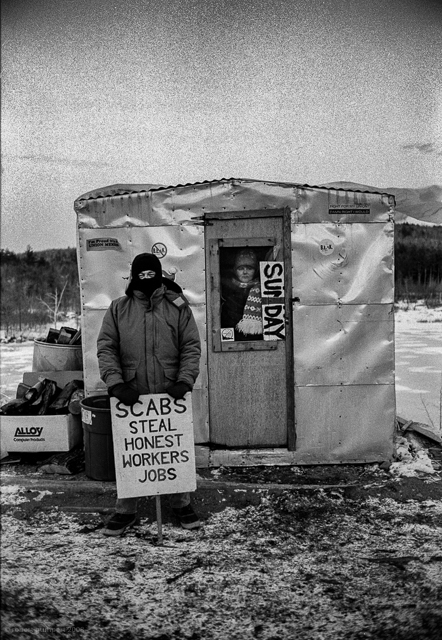
The word “strategy” is overused and is often confused with tactics. This is a problem not just for organized labor and progressive movements; it is also endemic in business and many other realms of organized activity. This seems odd, given that the literature on strategy and tactics is thousands of years old. This article draws on some of that classical literature, distinguishing strategy, tactics and longer-run planning, called “grand strategy” in the military-political context and probably best termed “organizational development” in the union context. The article also develops key elements of strategic planning for labor—the mobilization of resources; the calibration of ends to available means; and the concept of the “indirect approach.”
One of the most common mistakes of labor organizers is to confuse strategy and tactics—typically, to elevate a particular tactic to the level of overall strategy. Many organizers in construction see stripping—recruiting skilled, highly capable craftsmen from non-union contractors—as key. Or, in attacking bad behavior of a non-union contractor, an organizer might discover a vulnerability over wage and hour violations. Or, in approaching a non-union contractor, developer or customer, an organizer might have had prior experience setting up an inflatable rat to draw negative public attention.
As tactics, these are perfectly legitimate. The problem arises when one of these particular tactics is seen as a strategy—which should involve myriad particular tactics. Elevating a particular tactic to the level of strategy constrains the field of play. When your toolbox of potential tactics has only one or a small number of alternatives, it makes planning easy—because planning is non-existent. To say “we are organizing” is equated with the limited repertoire.
In getting away from this kind of thinking—which elevates tactics to the level of strategy—it is helpful to recognize that the English words are based on ancient Greek. 2,500 years ago, the stratēgoi were the generals elected by the assembly in Athens. They were accountable to the assembly, but they were charged with overall planning, leadership and coordination of military operations on many fronts. Tactics comes from the Greek taktikē, which has to do with drawing up troops for battle. Herodotus refers to the Athenian board of generals, the stratēgoi (6.109.1), who have a dispute over a great matter of strategy—whether to confront the Persians at Marathon. But once the decision was made and it was finally time to arrange troops for battle, a form of taktikē is the word used (6.111.1).[1]
Taktikē is also the origin of the word tactile: We can say that whenever you are engaging with your opponent, whenever you are touching them, as it were, you are employing a tactic. Strategy, in contrast, the activity of the generals, has to do with planning.
Because so many labor organizers in North America are familiar with American football, that analogy can be helpful. Strategy refers to the game plan: A large number of plays, with variations (depending on choices made by one’s opponent), and a large number of particular techniques—blocking and tackling techniques, for instance, or the proper running of pass routes—go into the plan. But the plan is distinct from particular tactics. The plan, the strategy, needs to weave hundreds or thousands of tactics and micro-techniques together in a coherent whole.
A strategic plan needs to employ multiple tactical elements and be articulated over time. This is a good litmus test—a single tactic (“the Rat”) that does not change through time (“We’re going to set up the rat until the cows come home…”) is not a strategy. Elevating a particular tactic to the level of strategy is analogous to reducing a game plan to a single play. If you are running off tackle on every play, you do not have a strategy.
Tactics, strategy—and grand strategy (or organizational policy/development)
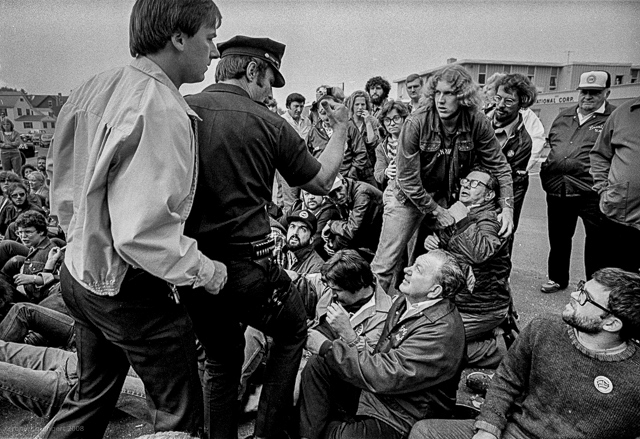
To stay with the football analogy, we distinguish game plan (strategy) from particular plays or techniques, which are up at the level of tactical engagement. Football people commonly retread the idea that they are focused “only on this week,” “only on this game.” They claim to have a one game at a time mentality. Coupled with the idea that each player and coach should focus “only on doing his job,” this is supposed to be a way to focus on the task at hand.
But someone in the organization, of course, needs to be thinking beyond next Sunday’s game. Someone needs to be thinking about the long-term health of the organization—in developing new players, for instance.
If strategy is the plan for a particular campaign, and tactics are the multiple ways of engaging with an opponent—or articulating in practice the strategy—there must also be an overarching organizational plan, a plan that transcends particular campaigns. For a sports team this might be a plan for a whole season or a multi-year program of building up a club. In American football, the head coach and his staff are responsible for game plans. It is typically a General Manager and his staff who are responsible for such things as player acquisition—a matter of organizational development. For a firm, long-term organizational strategy supersedes a campaign around a particular product. (It is the difference between the quarterly bottom line and a five – or ten – year growth plan that involves a whole range of products, and the organizational infrastructure necessary to develop them). For a nation state, grand strategy would involve overarching war aims. Strategy entails applying tactics to win in a campaign or on a front. But grand strategy involves winning the entire war—and creating a post-war world that is most advantageous. For an organization, grand strategy can be termed organizational policy or long-term planning for organizational development.
When considering tactics to employ in a strategic campaign, organizers need to keep in mind the situation after the campaign. The objective, typically, is to sign up a contractor or employer—we need to fight in a way that anticipates the settlement that we look forward to signing.
Sufficient resources and multiple elements
Organizers for union locals are often involved in all elements of planning and deployment of resources. That is, they are involved in tactical engagement (one-on-one discussions with potential recruits or subcontractors; production and distribution of flyers; testimony before a government body, etc.) but they can and should develop strategy for an organizing campaign. Additionally, they can become involved in longer-run planning, including the development of resources that can be built up for use in multiple campaigns.
In the building trades, we employ a 4 x 4 planning tool.[2] In addition to suggesting that a strategic plan be articulated through time, the 4 x 4 tool identifies four constituencies that a plan should address:
● current members;
● workers you aim to organize;
● contractors you seek to sign; and
● “secondaries,” a range of actors who potentially could influence the contractor (general contractors; developers; local politicians, etc.)
Too common, the organizer for a construction local has insufficient resources to engage in powerful organizing. So building up extra resources for organizing is prior to developing a strategic plan for a particular campaign. Thus, for instance, the development of a robust member-organizer program would be part of a long-term plan for organizational development.
Ends and Means
“Strategy depends for success, first and most, on a sound calculation and co-ordination of the ends and the means.”[3]
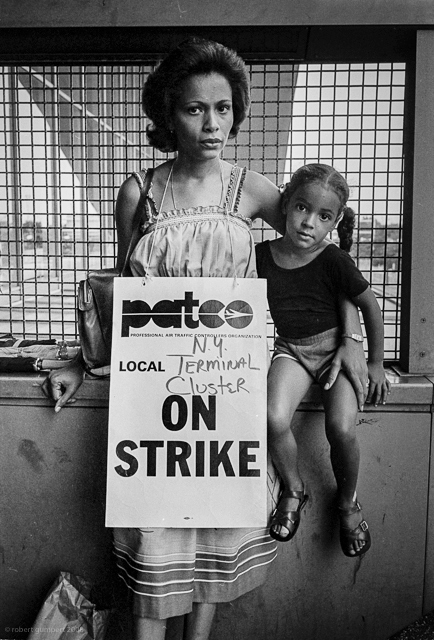
Here, a major pitfall is to overreach—to attempt more than is feasibly possible given available resources. Liddell Hart, an important twentieth century military strategist, considers the equilibration of ends to available means an essential axiom. Overreaching will lead to physical or psychological exhaustion, which will in turn erode confidence. This is a common mistake committed by dedicated organizers.
In our experience, even when a construction local has a full-time organizer, she/he has few additional resources at his/her disposal. The organizer might face indifference to organizing from the local’s leadership (since, for instance, bringing in new members potentially adds to the governability problems for elected leadership). Members are often indifferent to new organizing; they may see bringing new workers into the membership as cutting a finite pie of unionized work into ever smaller pieces (as opposed to seeing organizing as a matter of growing the union’s market share or density, so that there is more work to perform under unionized wages and conditions).
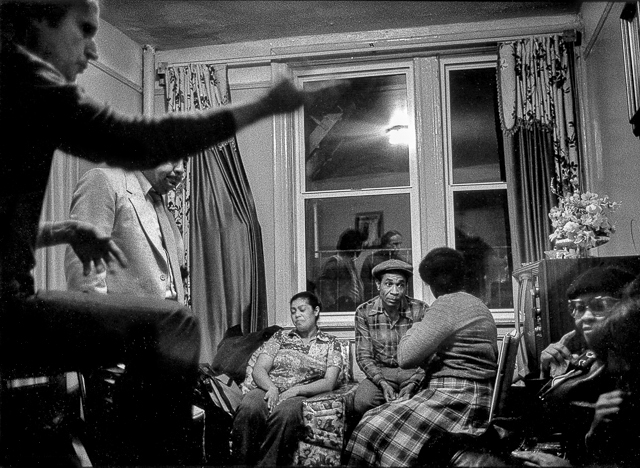
Prior to any particular organizing campaign, this points to the necessity, as an initial step, of developing an internal organizing committee—a significant minority of the working membership that could assist the full-time organizer. Similarly, the whole membership needs to be educated on the importance of organizing (which necessarily includes signing up new contractors), so that at the very least they are welcoming to workers who are new members in the local. Building up an organizing culture can be seen as vital to the development of resources. This is a task at the level of organizational policy. It transcends any particular organizing campaign.
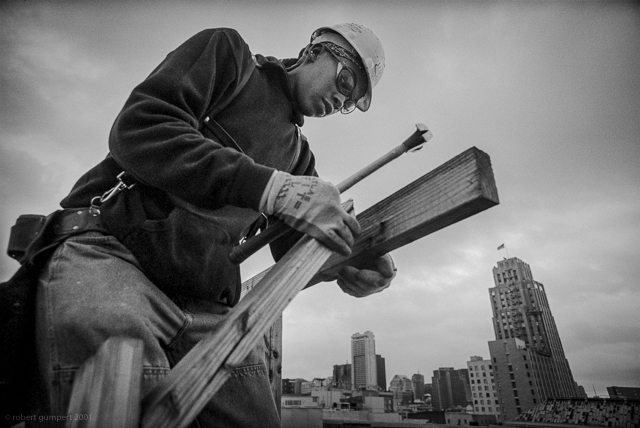
Liddell Hart contended that strategic thought was characterized by an “indirect approach.” In construction organizing, a direct approach would be a frontal assault on a contractor: for instance, simply going to the contractor and making a demand. An indirect approach would be more subtle. First, in relationship to the contractor himself, it means flipping the narrative: Instead of speaking of our interests as organized labor, we would speak of the contractor’s interests. For instance, skilled construction unions often have the most outstanding (or only) training program in a jurisdiction. When work is plentiful, contractors often come to us—a clear indication that they recognize the value of our apprenticeship programs.
But an indirect approach also means mapping key connections between the contractor and other actors: The contractor’s business is built upon relationships to general contractors, developers, political figures and more. Building up relationships in these (and other) areas is part of the indirect approach in labor organizing. It may be necessary to convince a General Contractor, developer or political body of the value of a skilled workforce. This suggests that considerable background research is a precondition of strategic planning. Just as film study for scouting advanced game planning in football, background research on projects, contractors, governmental bodies and more greatly facilitated strategic planning. A professional approach to planning necessitates thorough research. Is it an accident that Sun Tzu, whose Art of War is the great original text of military strategy, begins with “Estimates,” a process of researching/inventorying one’s own and one’s opponent’s strengths and weaknesses?[4]
In general, an indirect approach in organizing means
discovering one or more key relationships for the employer and developing a
plan to step in and interrupt these relationships.
[1] Herodotus: The History, ed. and trans. David Grene (Chicago: University of Chicago Press, 1987). Herodotus is considered the “father of history,” a Greek writer from the fifth century BC.
[2] The Campaign Guide: Organizing and Contract Enforcement in the Construction Industry, ed. Michael J. Hayes, Thomas Kriger, Richard Resnick, Hope Singer (Washington: Building Trades, 2014).
[3] Basil Liddell Hart, Strategy (New York: Praeger, 1967), p. 336.
[4] I recommend the translation by Samuel B. Griffith of Sun Tzu, The Art of War (Oxford: Oxford University Press, 1963). Sun Tzu was a general and writer during the Zhou Dynasty, in the 6th century BC. While research means digging through internet-based resources, the starting point is probably just systematically recording officers’ and members’ on-the-ground knowledge on contractors and markets.
…
With this post The Stansbury Forum will begin, from time to time, to include audio files of interviews with the authors and others. In the following Glenn Perusek in conversation with Stansbury Forum co-editor Peter Olney.
01: Introduction
02: A bit about the Greeks
03: Strategy, Tactics and American football
04: On the local level and grand Strategy
05: The Rat
06: Mind Games
07: You got to know your limitations
08: Ends and Means
09: Practice, fundamentals and teamwork
Release Xiangzi and Chinese Labor Activists
By Peter Olney

Updates:
5 January, 2020
From Change.org
Dear friends,
We are excited to hear Xiangzi and his two friends (who were detained at the same time) have now been released and united with friends and families.
While there is a possibility that the police will pursue their case further, for now they are safe. We will update you if there is further development.
2 January, 2020:
In news picked up from Facebook posts and text messages from organizers in the USA it appears activist Xiang Zi has been released. However as of 11:00 PST there is no official confirmation. We will post links when there are.
24 Dec, 2019
“Chinese authorities seized the prominent activist last week and punished him with a jail stint of at least two weeks for “provoking quarrels and stirring troubles,” according to a person with direct knowledge of his case who spoke on the condition of anonymity for fear of official reprisal.
The case of the U.S.-educated Chen, who ran a microblog called “Heart Sanitation,” illustrates …”
–International Federation for Human Rights: “China: Arbitrary arrest of Mr. Chen Weixiang”
Dec 23, 2019 —
“Dear all,
We are overwhelmed by your support. We expected a few hundred signatures, but now …. ” For more go here
.
I first met brother Xiangsi during the beginning of the “Gordon Mar for SF Supervisor” campaign in the early summer of 2018 as he attended the early organizing meetings for the campaign in our living room in the Sunset. This is a dedicated and principled working class advocate who insisted on returning to China to fight for his people. Hope everyone will lend a hand in seeking his release. A first step can be taken here.
Solidarity
In Re-Run Election: LA Times Journalist Wins Presidency of NewsGuild
By Steve Early

After a much contested election process, the largest union of journalists in North America has chosen a 32-year old reporter at the Los Angeles Times to be its new leader, in the U.S. and Canada.
Jon Schleuss helped win union recognition and a historic first contract at The Times (a non-union paper for 136 years) before ousting NewsGuild President Bernie Lunzer, a three-term incumbent twice his age.
In the first round of balloting last Spring, Lunzer beat Schleuss by a margin of 261 votes out of 2,300 cast. With backing from many upset members, Schleuss challenged those results, based on election irregularities.
To avoid a further appeal to the U.S. Department of Labor, the NewsGuild ordered a re-run, with voting overseen by the American Arbitration Association (AAA), a neutral third party. When the AAA completed its tally in New York City on Tuesday, Dec. 10, Schleuss emerged as the victor, receiving 1,979 votes vs 1,514 for Lunzer.
The challenger’s stronger showing this time was partly the result of more Guild members participating in their union’s unusual one member/one vote system of electing top officers. Overall turnout increased by more than 15%.
Schleuss, a data and graphics reporter, also benefited from a flurry of new endorsements. He was backed by past Guild officials, including former president Linda Foley, key Canadian Guild members, and activists at newspapers in New York, Philadelphia, Washington, Chicago, and Indianapolis.
In her statement of support, Foley recalled that she was once part of a generational challenge to older Guild leaders in the mid-1990s—who similarly opposed her bid to become the union’s first female president because of her alleged lack of “experience.” Foley lauded the role played by Schleuss and his co-LAT workers in a unionization campaign, which helped “inspire and empower a new generation of journalists and media workers.”
Foley believes that, as Guild president, Schleuss will promote “more organizing and a collective bargaining program to give members real voice and power” in a “news industry fraught with problems and promise.”
A Rare Candidate Debate
Schleuss will now also replace Lunzer on the international executive board of the Communications of Worker of America (CWA), a much larger AFL-CIO affiliate that includes 20,000 NewsGuild members. Among the highlights of the Guild presidential campaign was a debate between Lunzer and Schleuss that will hopefully create a precedent for candidate debates in other CWA internal union elections.
Debates may be a familiar part of campaigning for public office. But, within a supposedly democratic labor movement, they are fairly rare. For example, very few CWA local unions ever host candidate forums, where members can listen to and question competing candidates for local officer or executive board positions.
Higher up in CWA, contested elections for national officers and regional vice-presidents are decided by union convention delegates, not rank-and-file voting. Unfortunately, there is no tradition or requirement of candidate debates at CWA conventions either.
During two past races for CWA Executive Vice President and Secretary-Treasurer (that I was personally involved in) neither of the candidates who were executive board incumbents deigned to face their challengers—a practice continued by Lunzer when he initially spurned a debate proposed by Schleuss.
After Schleuss ran strongly in the first Guild election and a re-run was ordered, Lunzer still avoided any face-to-face exchange, in the front of a live membership audience. But he did agree to a joint conference call with his opponent that was moderated by retired CWA President Larry Cohen. On October 26, many Guild members were able to listen in and submit questions—either in advance or by text and email during the debate itself.
Issue-Oriented Exchange
For ninety minutes , Lunzer and Schleuss fielded questions about their respective records and plans to strengthen Guild organizing, bargaining, and membership mobilization. Lunzer argued that his four decades of local and national Guild leadership had long produced concrete results, like 4,000 new members being organized in recent years.
Schluess insisted that there was still much “need to reform and modernize the union,” which has faced stiff “new media” organizing competition from the Writers Guild of America-East.
Among the other challenges discussed was how to boost membership in the Guild’s “open shops” at the Washington Post, Bloomberg/BNA, and Associated Press; how to encourage more free-lancers to join the Guild (as three of its local unions already permit them to do); how to recruit more non-journalists who work for non-profit groups (the Guild already has about 1,000 members of this type); and how to respond more effectively to newspaper industry restructuring and ownership changes.
Job Security Threat
This last threat looms large in the daily work lives of many media workers, particularly the 1,100 Guild members in 33 bargaining units likely to be adversely affected by the pending merger of GateHouse Media and Gannett, Inc.
In a recent letter to the CEOs of Gannett and New Media Investment Group, which owns GateHouse, ten U.S. Senators expressed deep concern that management’s drive “to increase profits and shareholder value,” via post-merger cost-cutting, will result in further “hollowing out of newsrooms” and reduced local news coverage.
Both Lunzer and Schleuss agreed that the Guild must wage stronger labor-community fights against newspaper take-overs by “hedge-fund owners intent on looting the place and destroying journalism,” as Schleuss put it. To do that, the re-run election winner said he would seek more resources from the CWA national union and new ways of “tapping the creativity of the members” in stepped up contract campaigns.
In Schleuss’s view, there is no substitute for “members standing up in the newsroom, arm in arm,” as LA Times staffers did during their three-year struggle for union representation and a first contract covering 450 workers.
As Guild president for the next four years, Schleuss will now have to encourage–on a much larger scale–the same kind of rank-and-file initiative and grassroots organizing that turned his own newspaper into a union shop—and then fueled his successful challenge to Lunzer.
.
Steve Early was a supporter of Jon Schleuss’s campaign for union president.
…
“Note to Readers” On a Narrative Account of a Strike
By Heath Madom
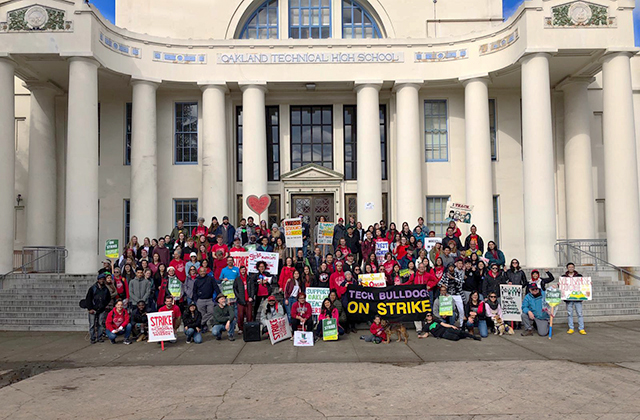
The experiences recounted here grew out of the efforts of a small group of Oakland United School District (OUSD) educators to encourage Oakland teachers and community members to tell their stories about the 2019 strike. The goal of that effort was—and continues to be—for individuals to share personal stories in order to promote communication, understanding, and healing in the aftermath of a strike that was incredibly powerful and unifying, yet also bitterly divisive and heartbreaking. Composition wise, the idea was to use an oral history structure similar to what Jacques Levy used in Cesar Chavez: Autobiography of La Causa, but with individuals writing their own stories.
What follows is a narrative account of the strike as I experienced it as a teacher at Oakland Technical High School. I did not initially plan on writing as much as I did, but once I got started, the project sort of took on a life of its own. I did my best to capture and represent my experience of the strike as honestly and accurately as my memory would allow. Any errors—factual, grammatical, or otherwise—are my fault alone. I hope that by sharing my story, others who were involved in the Oakland strike, or any of the recent teacher strikes across the nation, will be motivated to share theirs as well.
And with that, click HERE
…
State of Resistance – California Fights Back
By Fred Glass
State of Resistance: What California’s Dizzying Descent and Remarkable Resurgence Mean for America’s Future, by Manuel Pastor (New Press, 2018, 278 pages)
California Fights Back: The Golden State in the Age of Trump, by Peter Schrag (Heyday Press, 2018, 112 pages)

“California is America fast-forward,” says Manuel Pastor in State of Resistance: What California’s Dizzying Descent and Remarkable Resurgence Means for America’s Future. I hope he’s right, and the author gives us reason to think so.
So does former Sacramento Bee editor Peter Schrag in California Fights Back: The Golden State in the Age of Trump. Schrag foresees an attainable national future in the state’s self-assigned role as lead organizer of the opposition to Trump: “Given California’s size, demographic diversity, economic heft, and its (mostly) blue political hue, it’s not surprising that the state is both the leader of the resistance […] and, at the same time, a bright model of an alternative.”
Although each book largely presents latter-day California history with accuracy and insight, State of Resistance provides a deeper dive into the state’s complex social relationships, while California Fights Backfeatures a thinner but useful empirical recitation of how the state’s political actors have fought the Trump regime’s offense against immigrants, facts and common decency.
In both books we learn how, by the late twentieth century, the once lustrous Golden State had lost its sheen. When Governor Pete Wilson found himself behind in the polls in 1994, after his first term in office, the hitherto moderate Republican came up with an explanation for the state’s economic doldrums: illegal immigrants. He fashioned a ballot measure, Proposition 187, to deny undocumented immigrants and their children most state sponsored services, including public education, and sailed to reelection on these mean-spirited winds. (Prop 187 was soon found unconstitutional.)
A decade later, Arnold Schwarzenegger couldn’t plausibly finger immigrants as the source of his failure to deliver on bombastic campaign promises to “blow up the boxes” of government bureaucracy, since he had arrived on these shores from elsewhere himself—although, with Wilson, Iago-like, whispering in his ear, he briefly tried. Instead, the wealthy governor made scapegoats of public employees and their unions, and called a special election to deal what he imagined would be deathblows to these mortal enemies of the people. His ballot measures proposed to dismantle pensions, strip away job protections, and wrest for himself dictatorial control over the state budget.
But the electorate didn’t see things his way. Instead, teachers, nurses and firefighters, powered by grassroots organizing and a much smarter media strategy than Schwarzenegger’s, molded themselves into a secular Holy Trinity, and their union-funded campaign solidly defeated the once and future movie actor’s nasty ballot measures. Their cause was helped along by the Governator’s contemptuous demeanor, transparent lies about his opponents, and abrupt policy zigazgs.

Both authors see this as a turning point, or at least the moment that revealed California’s tectonic shift from celebrity media politics, conservative gutter ideologies and austerity policies a couple decades ago, to the present day when the state stands as a bulwark of ethnic tolerance and serious, if insufficient efforts to address the threats of economic inequality and climate change. Pastor in particular digs below the surface of electoral politics and personalities to diagnose the structural problems that led to the state’s decline and analyze its path to improvement in ways that might help others.
Thus two-time governor Jerry Brown often received plaudits, especially outside California, for the state’s phoenix-like rise from the Great Recession, during which time right-wing pundits enjoyed calling liberal California a “failed state.” (They still do, not having noticed, or choosing to ignore, the changed circumstances.) At the moment he was elected in 2010, public education was losing ten thousand K-12 teaching positions a year; services to seniors and the poor were slashed to the bone; and four of the top ten counties in the country hit hardest by the sub-prime housing crisis were to be found in the Central Valley.
During Brown’s tenure the state added
more than two million new jobs; the enormous and perennial budget deficits
carefully nurtured by tax-averse Republican administrations were supplanted by
substantial state surpluses and rainy day funds; and much (if far from all) of
the damage to the public sector wrought by long term systemic underfunding and
the Recession was repaired.

Brown deserves some credit. But as State
of Resistance explains, California’s return from the precipice depended
less on Brown and more on the evolution of four interlocking factors:
population demographics; the tech economy; progressive strategies; and the
ascension of a cohort of seasoned activists to the helms of unions and
community-based organizations, as well as to political office. These leaders’ lengthy trial by fire
during the slash and burn days of Wilson and Schwarzenegger forced them to
rethink where the state needed to go and how to transform the state’s politics
as usual in order to go there.
As Pastor puts it, their “work became more intersectional, linking immigrants and labor, environmentalists and social justice proponents, and community actors and policy makers….[R]ather than merely arguing against the newest inane right-wing idea, groups were rolling out concepts like living wages, community benefits agreements, immigrant-friendly policing, and environmental equity.”
Key to these developments was what Pastor calls “integrated voter engagement” with low-income communities of color, whose self-interest would line up with progressive goals—if the members of these communities voted. California Calls, a foundation-supported progressive advocacy coalition of community organizations, saw this voter recruitment and education project as one of two essential goals, the other being to reverse Proposition 13, the 1978 property-tax cutting disaster that exemplified Pastor’s vision of California as America fast-forward, only in the wrong direction.
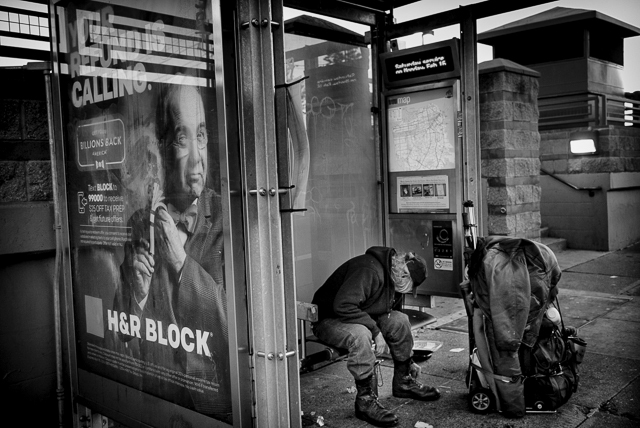
This template for small government, reduced tax, anti-social welfare and anti-union ideology, initially a California export in the early days of neoliberalism, today of course reigns supreme in Republican-controlled states as well as within the Trump administration. And this supposedly immutable California political preference was one of the favorite clubs wielded by conservative and liberal political consultants alike for decades to beat back any suggestion for progressive tax proposals that might fund investments in the state’s languishing public sector.
In 2010, Brown received a gift during the same election in which he became governor for a second time. A gathering sense of possibility among like-minded progressive groups led to passage of Proposition 25, which reduced the undemocratic legislative requirement for a two-thirds supermajority to pass a state budget each year, to a simple majority. This broke the toxic legislative power of the minority Republican caucus, which hovered just over one third, that had systematically underfunded public services and created the cynical anti-government smokescreen (typically accompanied by a “what can we do?” shrug) that “Sacramento is dysfunctional” when it was actually a conscious conservative scheme that kept the state gridlocked and its services starved.
The success of Prop 25 encouraged public sector unions and community groups like California Calls to move forward with plans to place a progressive tax measure on the 2012 general election ballot. Although ultimately supported by Jerry Brown, what eventually became Proposition 30 was quite different from the contours of his regressive initial proposal, which featured a one-cent sales tax increase as well as an across-the-board income tax bump.
Based on opinion research conducted by the California Federation of Teachers (CFT), a determined and rowdy labor-community coalition created a “millionaires tax” movement, and invited Brown to jettison his regressive proposal and join with them. After he refused to partner, the dueling ballot measures gathered signatures separately for several months while the contending forces waged a high-profile series of skirmishes in the media. Brown peeled away all the unions but one—CFT—from the coalition, threatening to veto any legislation they sponsored if they didn’t come over to his side.
But alongside CFT in the Millionaires Tax coalition remained California Calls, the Courage Campaign, and the Alliance of Californians for Community Empowerment (the former ACORN). It had just enough funding combined with its grassroots street and online capacities to propel its simple, radical message—”tax the rich for schools and services”—before the public eye and test out the thesis that together, bold progressive ideas and organizing the new electorate could change the state.
The coalition pressed its case in news-catching demonstrations, marches, news conferences, op-eds, and a steady barrage of endorsements by school and college districts and higher education student organizations organized by the coalition. This nimble juggernaut beat Brown in five straight matchups in opinion polls and put ten thousand demonstrators in the streets of Sacramento with Millionaires Tax signs outside his window. He finally sued for peace, agreeing to merge his effort with the coalition’s.
“If it can be done here, why not elsewhere?
Prop 30, a compromise measure that leaned more to the left than Brown’s earlier proposal, overcame an opposition campaign funded by right-wing billionaires in November 2012. With the governor on board, the entire labor movement and the state Democratic Party supported Prop 30, and beat back an anti-union salvo, Proposition 32, as well. These victories were critical for the health of the state. Prop 30 and its successor in 2016, Prop 55, which extended the measure for twelve years, brings California eight to ten billion dollars a year, essentially saving the public sector.
Props 30 and 55 boosted the top marginal income tax rates on families making half a million dollars a year, providing desperately needed relief to the strapped schools and social services that enable low income communities to survive—while similar populations are being hammered elsewhere in states run by Republican regimes propped up by gerrymandering, repressive voter restrictions and a mountain of political cash from wealthy conservatives.
This is the crux of the argument in these two books. At the same moment that Trump was riding his horse Xenophobe through a narrow passageway in the Electoral College to the presidency, California elected only Democrats to statewide offices, extended progressive tax revenues and decisively locked out a left-over anti-immigrant policy sharply limiting help for English learner students (Prop 58). If it can be done here, why not elsewhere?
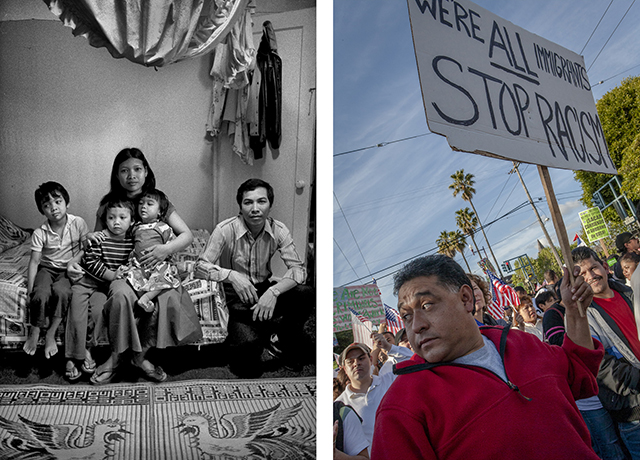
The path of the nation’s population growth, despite the Trump administration’s efforts, is into this demographic future: majority minority and immigrant, and California got there first.
Both authors understand that the California model, while infinitely preferable to what’s happening on the national stage, does not represent Utopia. They note that big problems remain to be resolved on the Lower Left Coast. Its own version of economic inequality features the largest proportion of poverty dwellers in the country alongside an insanely rich tech elite. Transportation infrastructure is crumbling amid housing stock falling farther and farther behind the bulk of the population’s need for shelter, with that scarcity driving housing costs beyond reach. Despite Prop 30’s assistance, California continues to underfund education and services measured against real needs, thanks in part to various provisions of Prop 13.
(This will be addressed directly in November 2020 by the same coalition that passed Props 30 and 55, with the “Schools and Communities First” ballot measure, now collecting signatures.)
And yes, substantial pockets of resistance to the Resistance remain to be eradicated in traditionally conservative areas of the state from urban San Diego to agricultural-cum-suburban central valleys to the far northern cow counties. Eyeing the distance still to travel, Pastor says,
“The real need is not for a great leader but for many leaders, not for winning at the top of the ticket but for winning across the board, not for pinning our hopes on one speech, one candidate or even one big march but rather counting on the grassroots organizing that brings people together face to face, race to race and place to place to see their common future.”
Here is where Pastor and Schrag diverge. Pastor, a USC professor and participant-observer sociologist, helped provide some of the research fueling the leftward push from progressive organizations that breathed new life into the California Dream, and his book’s proposals are undergirded by his direct experience with organizers and activism. Schrag, liberal author of a number of books on the state and former newspaper editor, marshals a veteran journalist’s care with specifics, but in enumerating many actions taken by California actors and institutions to resist the Trump agenda, focuses on elected officials, state institutions and law suits. For people who still believe at this perilous moment that facts can help win political arguments, Schrag offers ammunition.
He is not immune, however, to the occasional glib platitude, crediting Brown, for instance, with Prop 30, not knowing—or, if aware, not thinking it important enough to mention—what Pastor spends a fair amount of time carefully delineating: the convergence of strategy, organizing and leadership development on the broad left that turned the state’s finances around, representing for Pastor a significant part of what California has to offer the rest of the country as a model.
So how do these books, meant to provide a guide out of the Trumpist nightmare and into a brighter day, measure up to their intentions?
There is a slapdash quality to California Fights Back, as if in the haste to get the book out Schrag glued together the events and actions with liberal (and not so liberal) pieties, rather than digging into the more careful exposition we get from Pastor.
Conversely, Pastor’s view is that of the more thoughtful elements of the Democratic Party left since November 2016; in many ways that would be the natural audience for his book. Of course, it would be better if the centrist wing of the party were to be persuaded by State of Resistance, and by California Fights Back, too, in their shared arguments for following the lead of California toward a more inclusive and progressive United States. But Pastor’s focus and insistence on the long-term hard work of organizing for progressive change might not win over that particular audience.
That would be a shame, because the thrust of both books, especially State of Resistance, should be taken very seriously. Just as the xenophobic overreach of conservative policies and politics twenty years ago provided the wakeup call to California’s “sleeping giant” immigrant voter ranks, and seeded a new generation of progressive leadership that arose from struggles against such abusive politics, we may well be witnessing something similar arising on the national stage with the Trumpian assaults on democratic traditions, law, reason, and decency, and the consequent progressive surge—electoral and in other spheres of political life—in response to these insults.
Where we go as a nation from here—and whether it takes these California lessons to heart—remains to be seen. At least part of the tale will be told in November 2020. Meanwhile, I live in California, the State of Resistance, and for the reasons laid out in these two books, I’m not leaving any time soon.
…
“The Million Dollar Organizer: 365 Tips for Professional Union Organizers”, 2019 Bob Oedy
By Peter Olney
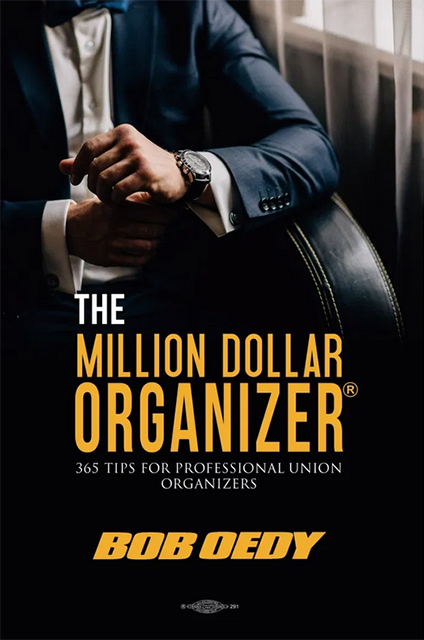
My son Nelson turned out as an International Brotherhood of Electrical Workers (IBEW) journey electrician in June of 2018. I was inspired by his graduation at which 44 apprentices were advanced to journey status. The majority of his flight were women and people of color. Not your daddy’s lily white all male cohort of thirty years ago. Progress indeed. I also was heartened that in 2016 when Bernie Sanders ran for President, the largest number of locals of any national union that endorsed him and supported him came out of the IBEW: 25 locals to be exact!
Since 2016 I have been conducting classes for the Building Trades Academy out of Michigan State University. My colleague Glenn Perusek and I teach basic organizing skills to mostly newly minted building trades organizers. Several of our students have been impressive young organizers from the ranks of the IBEW. When I saw a book on line called Bigger Labor: A Crash Course for Construction Union Organizers by Bob Oedy I ordered it and read it. I am always intrigued to share the art and craft of organizing with women and men in the field. I am particularly interested to read books about organizing in the construction industry because my own 45 years of experience is in organizing in industrial settings. I reached out to Oedy who comes out of IBEW 11, the big Los Angeles construction local. We had lunch at the historic Original Pantry restaurant in downtown LA.
Oedy is an impressive, personable guy with all the people skills that go with a successful organizer. In his life away from the labor trenches he is a punk rock musician. I liked Bigger Labor but Bob encouraged me to read his latest work, Million Dollar Organizer. The title and the cover, which pictures the watch-bejeweled sleeves of a very well dressed cuff linked man sitting in a posh leather chair, put me off. Whoa, I thought! Is this a manual for business unionism? A million dollar organizer and 365 tips, kind of hokey, no? Definitely not! The million dollars refers to a unionized worker’s cumulative earnings over the long haul and the 365 tips are an amazing assemblage of guidance for organizers. How anyone could come up with one tip on organizing for every day of the year amazes me. It also makes me wonder does Oedy have 365 more?
Nevertheless the great quantity of tips makes for some strange juxtapositions. Tip #283 gives instructions for the affiliation of employee associations and is followed by tip #284, which instructs an organizer on healthy eating habits. And then #285 instructs the organizer on how to master speaking tone in oral delivery. Harry Bridges, the legendary leader of my old union, the ILWU, is quoted on always trusting the rank and file, and Oedy translates that into Tip #237 “Make People Feel Important.” I learned several new terms including the word “koozie” which is an insulator for beverages! There are tips that advise organizers on personal conduct and avoiding burnout. The mechanics of the organizing process and NLRB regulations are precisely described. Record keeping, information gathering and banner making are all spelled out in great detail. This is not the kind of grand advice that one finds in Jacobin or other left labor and political journals. These are tips for the trenches but they are not without vision and heart. Tip #365 is “Pray for Guidance.” Oedy is a deeply religious man in the best sense of the word: He finishes the volume with these words: “Even if you are not religious at all, it’s easy to find inspiration in the knowledge that your life’s work will benefit your community and make the world a better place for future generations.” Combining detailed guidance with spiritual passion is a unique achievement.
Another resource for organizers that combines big picture with practical tips is of course The Troublemakers Handbook published by Labor Notes, the monthly journal that has been promoting rank and file organizing for almost forty years. Oedy gets deep into the practical weeds of the construction industry and his book is an invaluable companion for any organizer – veteran or novitiate.
When I lunched with Bob at the Pantry in September, I acknowledged his work, and then I asked him what his view was on the big strategic challenges facing the construction union trades. I cited the decrease of unionized workers from 60-70% of the construction market in the 1960’s to 13% today, and the horrifying fact that even in Manhattan the trades are only at 35% of the workforce in high rise construction (over 35 stories). Oedy told me that his work was not intended to address that macro issue and that he too was frustrated that there was not a master plan to deal with those precipitous declines in union power. He described the aborted attempt to organize the giant non-union electrical contractor, Helix. He too is anxious to see that big picture strategic discussion happen. Maybe we can impose on Brother Bob Oedy to make his next book a vision volume for mass organizing in the building trades? Meanwhile every organizer can benefit from his 365 tips. Order up “Million Dollar Organizer” .
…